
Neshannock Township is a township in Lawrence County, Pennsylvania, United States. The population was 9,609 at the 2010 census.
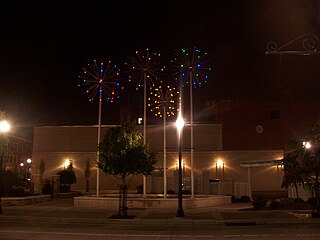
New Castle is a city in and the county seat of Lawrence County, Pennsylvania, United States. It is 50 miles (80 km) northwest of Pittsburgh near the Pennsylvania–Ohio border, approximately 18 miles (29 km) southeast of Youngstown, Ohio. As of the 2020 U.S. census, the city had a population of 21,926.

Penney OpCo LLC, doing business as JCPenney and often abbreviated JCP, is an American department store chain that operates 664 stores across 49 U.S. states and Puerto Rico. Departments inside JCPenney stores include Mens, Womens, Boys, Girls, Baby, Bedding, Home, Fine Jewelry, Shoes, Lingerie, The Salon by InStyle, JCPenney Beauty, as well as leased departments such as Seattle's Best Coffee, US Vision optical centers, and Lifetouch portrait studios.

King of Prussia is a shopping mall located in the community of King of Prussia in Upper Merion Township, Pennsylvania. It is the largest shopping mall in Pennsylvania and the fifth-largest shopping mall in the United States in terms of gross leasable area. It is an upscale mall with 450 retailers. Its anchor stores include Bloomingdale's, Dick's Sporting Goods, Macy's, Neiman Marcus, Nordstrom, and Primark with two vacant anchor spots last occupied by JCPenney and Lord & Taylor.
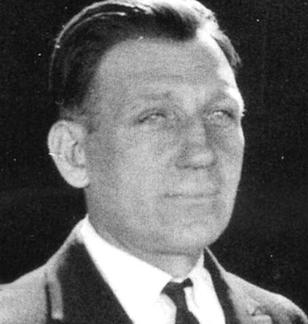
Samuel Louis Warner was an American film producer who was the co-founder and chief executive officer of Warner Bros. He established the studio along with his brothers Harry, Albert, and Jack L. Warner. Sam Warner is credited with procuring the technology that enabled Warner Bros. to produce the film industry's first feature-length talking picture, The Jazz Singer. He died in 1927, on the day before the film's enormously successful premiere.

Tower City Center is a large mixed-use facility in Downtown Cleveland, Ohio, on its Public Square. The facility is composed of a number of interconnected office buildings, including Terminal Tower, the Skylight Park mixed-use shopping center, Jack Cleveland Casino, Renaissance Cleveland Hotel, Chase Financial Plaza, and Tower City station, the main hub of Cleveland's four RTA Rapid Transit lines.
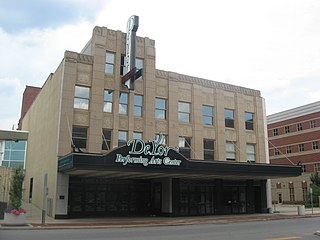
Powers Auditorium, in Youngstown, Ohio is one of the largest auditoriums in the Youngstown-Warren area. The facility is the main venue of downtown Youngstown's DeYor Performing Arts Center. The complex also includes the Adler Art Academy, Beecher Flad Pavilion, and Ford Family Recital Hall. Originally built in 1931 as the Warner Theatre, the former movie palace was renovated and reopened as Powers Auditorium in 1969.
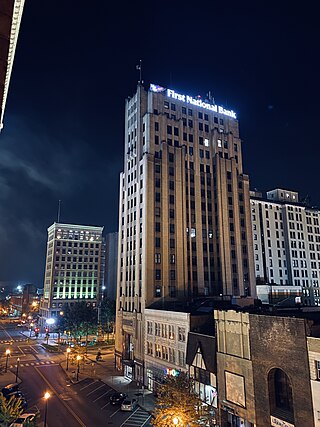
Downtown Youngstown is the traditional center of the city of Youngstown, Ohio. After decades of precipitous decline, the downtown area shows signs of renewal. Civic leaders have expressed hope that the district will emerge as a significant arts and entertainment district within the Youngstown-Warren metropolitan area.
Oakland City Center is an office, shopping and hotel complex in Downtown Oakland, Oakland, California. The complex is the product of a redevelopment project begun in the late 1950s. It covers twelve city blocks between Broadway on the east, Martin Luther King Jr. Way on the west, Frank H. Ogawa Plaza on 14th Street on the north side of the complex and the Oakland Convention Center and Marriott Hotel extend south to 10th Street. An hourly parking garage is located beneath the complex's shopping mall. The mall features an upscale fitness and racquet club, in addition to numerous take-out restaurants and other stores. The complex is served by the 12th Street/Oakland City Center BART station.

The Colorado Convention Center (CCC) is a multi-purpose convention center located in Downtown Denver, Colorado. At 2,200,000 square feet it is currently the 12th largest convention center in the United States. It opened in June 1990; the first event being the NBA draft for the Denver Nuggets. The convention center was expanded in 2004 to include several meeting rooms, two ballrooms and an indoor amphitheater. Since opening, the center hosts an average of around 400 events per year. Centrally located in the city, it has become one of Denver's many landmarks due to its architecture and is adjacent to the Denver Performing Arts Complex and is just blocks away from the Colorado State Capitol, Auraria Campus and the 16th Street Mall. The CCC is directly served via light rail by RTD's Theatre District–Convention Center station.

The urban development patterns of Lexington, Kentucky, confined within an urban growth boundary that protects its famed horse farms, include greenbelts and expanses of land between it and the surrounding towns. This has been done to preserve the region's horse farms and the unique Bluegrass landscape, which bring millions of dollars to the city through the horse industry and tourism. Urban growth is also tightly restricted in the adjacent counties, with the exception of Jessamine County, with development only allowed inside existing city limits. In order to prevent rural subdivisions and large homes on expansive lots from consuming the Bluegrass landscape, Fayette and all surrounding counties have minimum lot size requirements, which range from 10 acres (40,000 m2) in Jessamine to fifty in Fayette.

The Time Warner Cable Amphitheater was an outdoor concert venue and part of the mixed-use Tower City Center development in downtown Cleveland, Ohio.
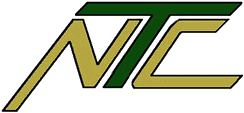
New Castle Area Transit Authority is a public transportation service located in Lawrence County, Pennsylvania. It provides inter-city bus and paratransit service to select communities within the county. Because the region is located within the metropolitan area of Pittsburgh, service is provided to the downtown area.

The Core, which consists of TD Square, the Holt Renfrew building, the Stephen Avenue Place shops, and the former Calgary Eaton Centre, is the dominant shopping complex located in the downtown core of Calgary, Alberta, Canada. It spans three city blocks and contains approximately 160 retailers on four levels. The property also contains six major office towers (TD Canada Trust Tower, Home Oil Tower, Dome Tower, and the historic Lancaster Building. It is the hub of downtown Calgary's +15 skywalk system, and as such is the busiest shopping centre in the city by pedestrian count, with around 250,000 visitors passing through each week. The centre's architectural focal point is a vast suspended glass skylight which spans the length of the complex. As of October 29, 2010, The Core offers free evening and weekend parking at its underground lots.

The economy of Youngstown, Ohio, United States, flourished in the 19th and early 20th centuries, with steel production reaching all-time highs at that time. The steel boom led to an influx of immigrants to the area looking for work, as well as construction of skyscrapers in the area. The city's population peaked at 170,002 in 1930, just at the onset of the Great Depression. World War II also brought a great demand for steel. After World War II, demand for steel dropped off dramatically, and industrial base of Youngstown began to see a decline.

7th Street is a street in Los Angeles, California running from S. Norton Ave in Mid-Wilshire through Downtown Los Angeles. It goes all the way to the eastern city limits at Indiana Ave., and the border between Boyle Heights, Los Angeles and East Los Angeles.

Retail in Southern California dates back to its first dry goods store that Jonathan Temple opened in 1827 on Calle Principal, when Los Angeles was still a Mexican village. After the American conquest, as the pueblo grew into a small town surpassing 4,000 population in 1860, dry goods stores continued to open, including the forerunners of what would be local chains. Larger retailers moved progressively further south to the 1880s-1890s Central Business District, which was later razed to become the Civic Center. Starting in the mid-1890s, major stores moved ever southward, first onto Broadway around 3rd, then starting in 1905 to Broadway between 4th and 9th, then starting in 1915 westward onto West Seventh Street up to Figueroa. For half a century Broadway and Seventh streets together formed one of America's largest and busiest downtown shopping districts.















